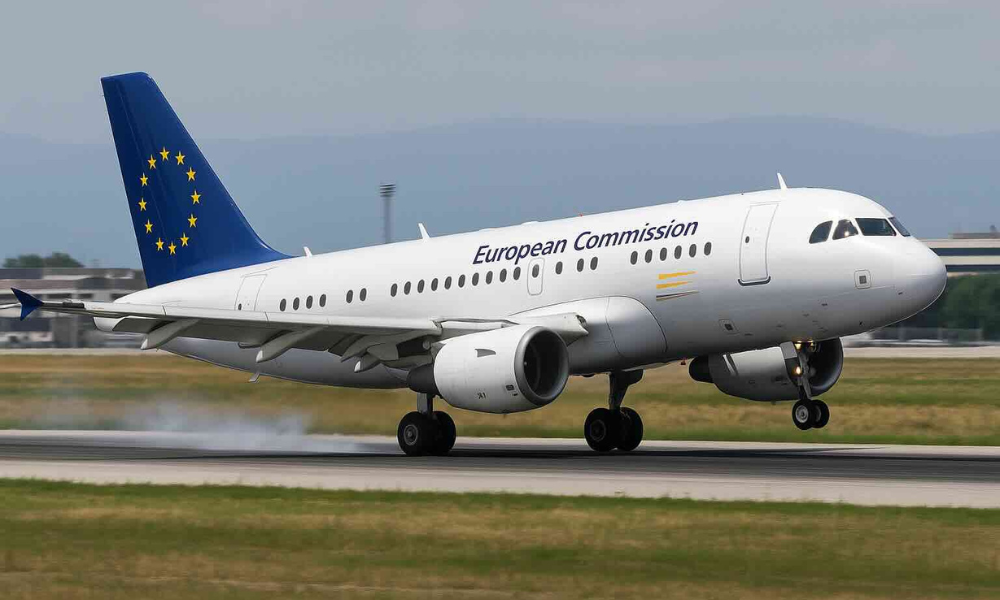Suspected Russian GPS Jamming Targets EU President’s Plane Amid Escalating Hybrid Threats
In a stark escalation of hybrid warfare tactics, a plane carrying European Commission President Ursula von der Leyen encountered severe GPS jamming on August 31, 2025, while attempting to land at Plovdiv International Airport in southern Bulgaria. The incident, which forced pilots to rely on backup navigation systems including paper maps, has been attributed by Bulgarian authorities to deliberate Russian interference—though Moscow has firmly denied involvement. This event underscores a troubling surge in electronic disruptions across Europe, highlighting vulnerabilities in aviation infrastructure and intensifying calls for bolstered EU defenses as the Ukraine conflict drags on.
The disruption occurred during von der Leyen’s multi-nation tour of eastern EU member states, aimed at rallying support for Ukraine and enhancing regional security amid Russia’s ongoing invasion. As her chartered aircraft approached Plovdiv, GPS signals across the airport area were jammed, compelling the pilots to circle for approximately an hour before landing safely. European Commission spokesperson Arianna Podestà confirmed the jamming, stating that Bulgarian officials suspected “blatant interference by Russia,” while emphasizing that such “threats and intimidations are a regular component of Russia’s hostile behavior.” The plane’s safe touchdown was achieved through alternative methods like radio navigation, averting any immediate danger but exposing the risks of such attacks.
Kremlin spokesperson Dmitry Peskov dismissed the allegations as “incorrect,” with no immediate evidence publicly released by Bulgaria to substantiate the claims. However, the incident fits into a broader pattern of alleged Russian hybrid operations, including GPS jamming and spoofing—techniques that overwhelm or falsify satellite signals to disrupt navigation. Experts note that while commercial aircraft have redundancies to handle such failures, these attacks can heighten collision risks or force diversions, potentially endangering lives.
Emerging Trends in Electronic Warfare
This is not an isolated occurrence. GPS interference has become a “constant feature” in European airspace, particularly near Russia’s borders, evolving from sporadic events to normalized threats. An internal EU document from May 2025 described these as “systemic, deliberate actions by Russia and Belarus,” noting a sharp rise in cases: Poland reported 2,732 incidents in January 2025 (up from 1,908 in October 2023), while Lithuania saw 1,185 (up from 556 in March 2024). These disruptions extend beyond aviation, affecting maritime traffic and even ground-based systems, and are seen as low-cost tools for Moscow to sow chaos without direct military confrontation.
The Baltic region has been a hotspot, with Estonia accusing Russia of jamming airspace in 2024, leading to flight diversions by carriers like Finnair. In June 2025, 13 EU states raised alarms over escalating jamming threats, prompting the bloc to sanction companies linked to Russian signal disruptions. Keir Giles, a senior fellow at Chatham House’s Russia and Eurasia Programme, told reporters that no effective countermeasures have yet deterred Moscow, allowing the campaign to expand unchecked.
Broader geopolitical tensions amplify these trends. With Russia’s war in Ukraine entering its fourth year, hybrid attacks serve as proxies for direct aggression. Von der Leyen’s tour, which included visits to arms factories and discussions on Ukraine aid, comes amid stalled peace efforts following a U.S.-hosted summit between Presidents Donald Trump and Vladimir Putin in August 2025. Hopes for a ceasefire remain low, with a Trump-imposed deadline for Russian action expiring this week and French President Emmanuel Macron accusing Putin of manipulating negotiations.
Key Players and EU Response
Ursula von der Leyen emerges as a central figure, her staunch pro-Ukraine stance making her a symbolic target. As EC president, she has pushed for increased defense spending and security guarantees for Kyiv, including “pretty precise plans” for a multinational “coalition of the willing” force post-conflict, backed by U.S. capabilities. This proposal drew criticism from German Defense Minister Boris Pistorius, who argued the EU lacks the mandate for such deployments and called the remarks premature.
On the Russian side, Putin continues to leverage hybrid tactics while engaging in diplomacy, recently claiming “understandings” with Trump at a Shanghai Cooperation Organisation forum. Allies like Belarus are implicated in interference, complicating attribution.
The EU’s response includes deploying additional low-Earth-orbit satellites to detect jamming, crafting aviation-specific countermeasures, and committing to higher defense investments. EU Defense Commissioner Andrius Kubilius highlighted the incident as a “stark warning” for electronic resilience. Meanwhile, NATO members like Germany report similar GPS issues during military flights, signaling a need for alliance-wide strategies.
Implications and Ethical Considerations
This incident raises ethical questions about state-sponsored disruptions: While no lives were lost, the potential for catastrophe demands accountability. Journalism here must balance urgency with verification—relying on official statements and expert analysis while noting Russia’s denials to avoid bias. As von der Leyen herself stated post-incident, she was “outraged” and vowed tighter sanctions on Moscow.
In an era of blurred warfare lines, Europe’s skies are a new frontline. This event may catalyze unified action, but without concrete deterrence, such attacks could become the norm, eroding trust in global navigation and escalating East-West tensions. As the Ukraine war evolves, monitoring these trends will be crucial for understanding the full spectrum of modern conflict.
